As a parent, caring for your baby’s delicate skin is one of the most important aspects of their daily routine. A baby’s skin is incredibly soft, sensitive, and prone to various issues, making it crucial to choose the right products for gentle and effective care.
In this comprehensive guide, we’ll explore the best baby skin care products available, helping you make informed decisions to keep your baby’s skin healthy, protected, and nourished.
Understanding Baby Skin
Before we dive into product recommendations, it’s essential to understand what makes baby skin unique. Compared to adult skin, a baby’s skin is thinner, more delicate, and has a higher pH level.
This makes it more susceptible to irritation, dryness, and environmental damage.
The skin barrier function in babies is not fully developed, which means their skin loses moisture more quickly and is more vulnerable to external factors. This is why it’s crucial to use products specifically formulated for baby skin and to be extra gentle when caring for it.
Key Ingredients to Look For
When selecting skincare products for your baby, it’s important to prioritize gentle, nourishing ingredients that won’t irritate their sensitive skin. Some useful ingredients include:
Ceramides
Ceramides are lipids that help strengthen the skin barrier and keep moisture. They’re naturally present in our skin but can be depleted by environmental factors or harsh products.
Look for baby skincare products that contain ceramides to help support your baby’s skin barrier function.
Hyaluronic Acid
Hyaluronic acid is a natural moisturizer that helps keep skin hydrated. It can hold up to 1000 times it’s weight in water, making it an excellent ingredient for keeping baby skin soft and supple. Don’t worry about the word “acid” – hyaluronic acid is very gentle and suitable for baby skin.
Colloidal Oatmeal
Known for it’s soothing properties, colloidal oatmeal is especially useful for eczema-prone skin. It can help relieve itching and irritation while providing gentle moisturization. Products containing colloidal oatmeal are often recommended for babies with sensitive or easily irritated skin.
Glycerin
Glycerin is a humectant that helps attract and keep moisture in the skin. It’s a common ingredient in many baby skincare products because of it’s gentle nature and effectiveness in keeping skin hydrated.
Aloe Vera
Aloe vera offers soothing and healing properties for irritated skin. It’s often used in products designed to calm and cool the skin, making it a great ingredient for baby skincare, especially during hot weather or after sun exposure.
Ingredients to Avoid
Just as important as knowing what to look for is understanding which ingredients to avoid in baby skincare products. Here are some ingredients you should steer clear of:
Fragrances and Dyes
Artificial fragrances and dyes can be irritating to sensitive skin. They’re often added to products to make them smell nice or look appealing, but they serve no useful purpose for your baby’s skin. Opt for fragrance-free and dye-free products whenever possible.
Parabens
Parabens are preservatives commonly used in skincare products to prevent the growth of bacteria and mold. However, some studies have suggested that they may disrupt hormone function.
While the research is ongoing, many parents prefer to err on the side of caution and choose paraben-free products for their babies.
Phthalates
Phthalates are often found in fragrances and may cause developmental issues. They’re used to help fragrances last longer, but they’re not necessary for baby skincare products.
Look for products that explicitly state they are phthalate-free.
Sulfates
Sulfates are harsh cleansing agents that can strip the skin of it’s natural oils. They’re often used in products that foam up, like shampoos and body washes.
However, they can be too harsh for a baby’s delicate skin and may cause dryness or irritation.
Mineral Oil
Mineral oil is a petroleum by-product that can clog pores and interfere with the skin’s natural functions. While it’s often used in baby oils because of it’s low cost and ability to create a barrier on the skin, there are better, more natural alternatives available.
Top Baby Skin Care Products
Now that we’ve covered what to look for and what to avoid, let’s explore some of the top baby skin care products available in the market:
1. Gentle Cleansers
When it comes to cleansing your baby’s skin, less is often more. Look for mild, soap-free cleansers that won’t strip the skin of it’s natural oils.
Cetaphil Baby Wash & – Shampoo
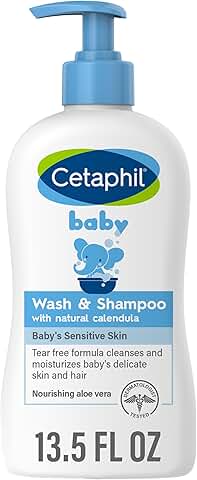
This tear-free formula is hypoallergenic and enriched with soothing organic calendula. It’s gentle enough for everyday use and helps maintain the skin’s natural moisture balance.
The Cetaphil Baby Wash & – Shampoo is an excellent choice for daily use, especially for babies with sensitive skin.
Aveeno Baby Gentle Wash & – Shampoo
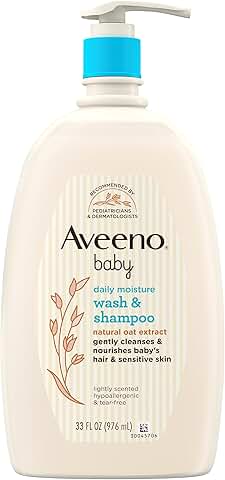
Another great option is the Aveeno Baby Gentle Wash & – Shampoo. This tear-free, hypoallergenic formula is made with natural oat extract, known for it’s soothing properties.
It cleanses without drying and is suitable for sensitive skin. The oat extract helps to calm and nourish the skin while gently cleansing.
2. Moisturizers
Keeping your baby’s skin hydrated is crucial for maintaining it’s health and preventing dryness and irritation. Here are two excellent moisturizer options:
Aveeno Baby Daily Moisture Lotion
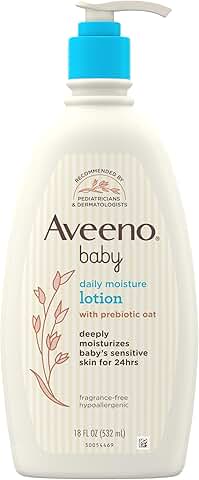
The Aveeno Baby Daily Moisture Lotion is a fantastic choice for daily moisturizing. It contains natural colloidal oatmeal and dimethicone, which help protect and soothe the skin while providing long-lasting hydration.
This lotion is particularly good for babies with dry or sensitive skin, as the oatmeal helps to calm and protect.
Earth Mama Organic Baby Lotion
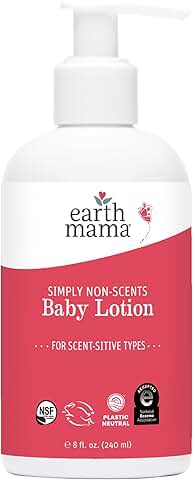
For a more natural option, consider the Earth Mama Organic Baby Lotion. This lotion is made with organic herbs and oils, including calendula and aloe vera, to nourish and protect delicate skin. It’s free from artificial fragrances and preservatives, making it ideal for sensitive skin. The organic ingredients provide gentle, natural nourishment for your baby’s skin.
3. Diaper Rash Cream
Diaper rash is a common concern for many parents. Here are two highly effective products to help treat and prevent diaper rash:
Boudreaux’s Butt Paste Diaper Rash Cream
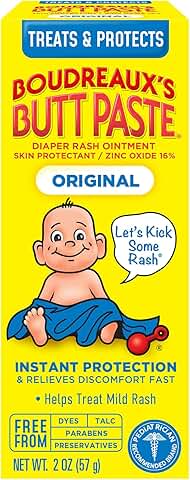
Boudreaux’s Butt Paste Diaper Rash Cream creates a protective barrier to help treat and prevent diaper rash. It contains zinc oxide, which has both soothing and healing properties.
This thick, paste-like cream stays put and provides long-lasting protection against moisture and irritation.
Weleda Diaper Care Cream
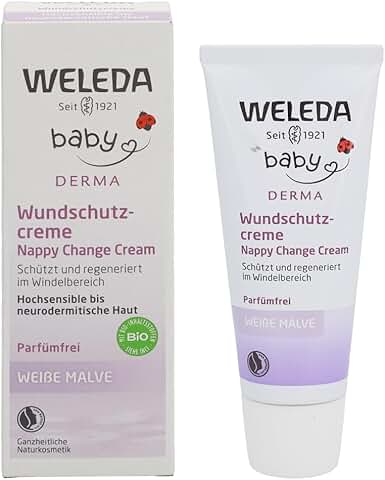
Another excellent choice is the Weleda Diaper Care Cream. This natural formula contains calendula extract and zinc oxide to soothe irritated skin and protect against moisture.
It’s free from synthetic preservatives, fragrances, and mineral oils.
The calendula in this cream helps to calm inflammation and promote healing.
4. Sunscreen
Protecting your baby’s delicate skin from harmful UV rays is essential. Here are two excellent sunscreen options for babies:
Thinkbaby Safe Sunscreen SPF 50+
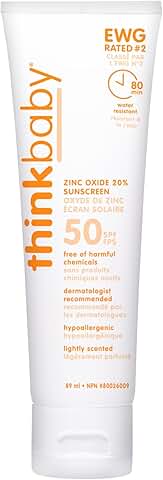
The Thinkbaby Safe Sunscreen SPF 50+ is a mineral-based sunscreen that’s safe for babies and effective in blocking both UVA and UVB rays. It’s water-resistant and free from harmful chemicals, making it an excellent choice for outdoor activities.
The mineral-based formula provides a physical barrier against the sun’s rays, which is gentler on baby skin than chemical sunscreens.
Blue Lizard Baby Mineral Sunscreen SPF 50+
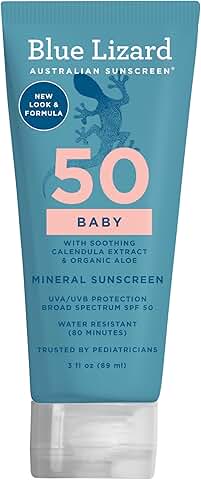
For sensitive skin, the Blue Lizard Baby Mineral Sunscreen SPF 50+ is another great option. This zinc oxide-based sunscreen provides broad-spectrum protection without irritating ingredients.
It’s also reef-friendly and free from parabens and fragrances.
The bottle turns blue when exposed to UV light, serving as a helpful reminder to reapply.
5. Baby Oil
While traditional mineral oil-based baby oils have fallen out of favor, there are safer choices available:
Burt’s Bees Baby Nourishing Baby Oil

The Burt’s Bees Baby Nourishing Baby Oil is made with 100% natural ingredients, including apricot and grape seed oils. It’s perfect for baby massage and helps keep skin soft and smooth without clogging pores.
The natural oils provide nourishment and hydration without the potential drawbacks of mineral oil.
Weleda Baby Oil
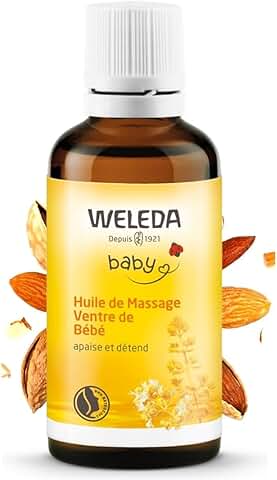
Another excellent option is the Weleda Baby Oil. This gentle, nourishing oil is made with sweet almond oil and calendula extract to soothe and protect delicate skin. It’s free from synthetic fragrances, colors, and preservatives.
The calendula in this oil helps to calm and soothe the skin, making it particularly good for babies with sensitive or easily irritated skin.
Caring for Eczema-Prone Baby Skin
Eczema is a common skin condition in babies, characterized by dry, itchy, and inflamed skin. If your baby has eczema-prone skin, it needs extra care and attention. Here are some tips:
- Use a gentle, fragrance-free cleanser specifically formulated for eczema-prone skin.
- Moisturize often with a thick, emollient cream or ointment.
- Avoid harsh fabrics and opt for soft, breathable clothing.
- Keep your baby’s nails short to prevent scratching.
- Consider using a humidifier in your baby’s room to add moisture to the air.
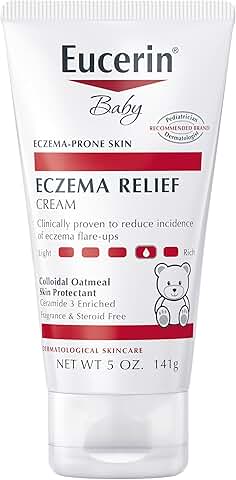
One product that’s particularly good for eczema-prone skin is the Eucerin Baby Eczema Relief Body Cream. It’s enriched with colloidal oatmeal, ceramides, and licochalcone (a licorice root extract) to soothe and protect sensitive, eczema-prone skin. The combination of these ingredients helps to relieve itching, reduce redness, and strengthen the skin barrier.
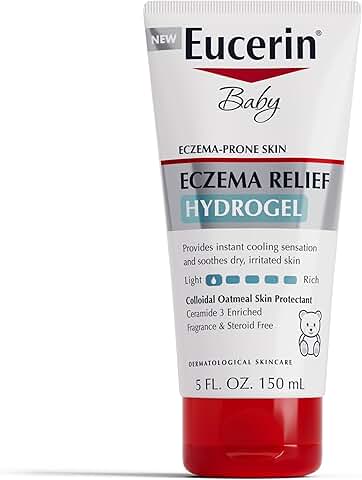
If you want to try another product for your baby’s eczema-prone skin, you can try Eucerin Baby Eczema Relief Hydrogel. It’s a soothing, fragrance-free formula with colloidal oatmeal, ceramides, and hyaluronic acid. It provides instant relief for dry, itchy, eczema-prone skin, while strengthening the skin’s barrier and offering 24-hour hydration. Safe for babies 3 months and older, it’s free from steroids, fragrances, and parabens.
Creating a Simple Baby Skincare Routine
While babies don’t need an elaborate skincare routine, a simple, consistent approach can help keep their skin healthy. Here’s a basic routine you can follow:
Cleanse
Use a gentle, pH-balanced cleanser during bath time. For newborns, 2-3 times a week is usually enough.
As your baby gets older, you can bathe them daily if needed, but be sure to use a gentle, moisturizing cleanser to prevent dryness.
Moisturize
Apply a gentle, fragrance-free moisturizer immediately after bathing while the skin is still damp. This helps to lock in moisture and keep your baby’s skin soft and supple.
Pay extra attention to any dry or rough areas.
Protect
Use a zinc oxide-based diaper cream during diaper changes to prevent rash. Apply a thin layer to create a barrier between your baby’s skin and potential irritants.
If your baby is prone to diaper rash, you may want to apply this at every diaper change.
Sun Protection
Apply a baby-safe sunscreen when going outdoors. Even on cloudy days, UV rays can damage your baby’s delicate skin. Be sure to reapply every two hours or after swimming or excessive sweating.
Remember, every baby is unique, and what works for you may not work for another. Always talk to your pediatrician if you have concerns about your baby’s skin or before introducing new products into your routine.
The Truth About Baby Skin Color
It’s important to address a common misconception about baby skin color. Many parents wonder if there are products that can maintain or alter their newborn’s skin color.
A baby’s skin color is determined by genetics and will naturally change and develop over time.
There are no safe or effective products that can alter a baby’s natural skin tone, nor should this be a goal of skincare. Instead of focusing on skin color, the aim should be to keep your baby’s skin healthy, protected, and well-moisturized. This will allow your baby’s natural, beautiful skin tone to shine through.
It’s normal for a baby’s skin color to change in the first few months of life. Newborns often have a reddish or purplish tint to their skin, which gradually fades.
Some babies may develop a yellowish tint (jaundice) in the first few days after birth, which usually decides on it’s own but should be monitored by a healthcare provider.
As your baby grows, their skin will continue to develop and may change color slightly. This is all part of the natural process of skin development and is not something that needs to be altered or “fixed” with skincare products.
Natural Remedies for Common Baby Skin Issues
While there are many excellent commercial products available for baby skincare, some parents prefer to use natural remedies for minor skin issues. Here are a few safe, natural options:
Coconut Oil
Pure, organic coconut oil can be an excellent natural moisturizer for baby skin. It has antimicrobial properties and can help soothe dry, irritated skin. However, if your baby has very sensitive skin or is prone to allergies, it’s best to do a patch test first.
Breast Milk
For breastfeeding mothers, breast milk can be a surprising remedy for minor skin irritations. It has natural antibacterial properties and can help soothe diaper rash, minor cuts, or scrapes.
Simply apply a small amount to the affected area.
Chamomile Tea
Cooled chamomile tea can be used as a gentle, soothing wash for irritated skin. It has anti-inflammatory properties that can help calm redness and itching. You can use it as a compress or add it to your baby’s bath water.
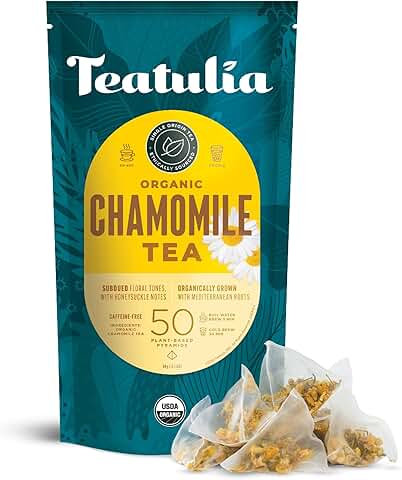
Teatulia Organic Chamomile Tea Bags are made from raw, whole-leaf chamomile flowers, sustainably grown in Egypt. This caffeine-free herbal tea is perfect for soothing and calming eczema-prone skin. By using the cooled tea in a baby bath, it helps to gently relieve irritation and promote relaxation. The tea comes in 50 pyramid teabags, and the packaging is 100% compostable, making it an eco-friendly choice for both your baby and the environment.
Oatmeal Bath
For babies with very dry or itchy skin, an oatmeal bath can provide relief. Grind plain, unflavored oats into a fine powder and add to lukewarm bathwater.
This can help soothe irritated skin and provide moisture.
While these natural remedies can be helpful for minor issues, always talk to your pediatrician for persistent or severe skin problems.
The Importance of Patch Testing
When introducing any new skincare product to your baby, it’s crucial to do a patch test first. This helps to confirm that your baby doesn’t have an allergic reaction to the product.
Here’s how to do a patch test:
- Choose a small area of skin, typically on the inside of the wrist or the crook of the elbow.
- Apply a small amount of the product to this area.
- Wait 24-48 hours and observe the area for any signs of reaction, such as redness, swelling, or itching.
- If there’s no reaction after 48 hours, it’s likely safe to use the product.
Remember, even if a product is labeled as “hypoallergenic” or “for sensitive skin,” it’s still possible for your baby to have a reaction. Always err on the side of caution and perform a patch test.
The Role of Diet in Baby Skin Health
While topical skincare products play a crucial role in maintaining your baby’s skin health, diet can also have an impact. For breastfed babies, the mother’s diet can influence the composition of breast milk, which in turn can affect the baby’s skin.
For mothers who are breastfeeding, consuming a balanced diet rich in fruits, vegetables, whole grains, and healthy fats can help provide the nutrients necessary for healthy skin development. Foods rich in omega-3 fatty acids, such as fatty fish, chia seeds, and walnuts, can be particularly useful for skin health.
For formula-fed babies, choosing a high-quality formula that contains essential fatty acids and other nutrients important for skin health is crucial. Always talk to your pediatrician about the best formula options for your baby.
As your baby starts solid foods, introducing a variety of fruits and vegetables can help provide the vitamins and minerals necessary for healthy skin. Foods rich in vitamin C, vitamin E, and beta-carotene can be particularly useful for skin health.
The Impact of Environmental Factors on Baby Skin
Environmental factors can have a significant impact on your baby’s skin health. Here are some factors to consider:
Temperature and Humidity

Extreme temperatures and low humidity can dry out your baby’s skin. In cold weather, use a humidifier in your baby’s room and avoid overheating your home. In hot weather, keep your baby cool and hydrated, and avoid excessive sun exposure.
The LEVOIT Top Fill Humidifier is designed to provide soothing cool mist for large rooms, making it perfect for a baby’s nursery. With a 2.5L tank, it offers up to 25 hours of continuous use and operates quietly at just 28dB. The easy-to-fill and clean design ensures convenience, while the auto shut-off feature and BPA-free construction prioritize safety. Ideal for maintaining optimal humidity levels, it helps keep the air comfortable and healthy for both babies and parents.
Water Quality
Hard water can be harsh on baby skin. If you live in an area with hard water, consider using a water softener or filtering system. When bathing your baby, use lukewarm water and limit bath time to prevent drying out the skin.
Clothing and Fabrics
Choose soft, breathable fabrics for your baby’s clothing and bedding. Natural fibers like cotton are often best.
Avoid scratchy fabrics and always wash new clothes before your baby wears them to remove any residual chemicals from the manufacturing process.
Air Pollution
Air pollution can have negative effects on skin health. If you live in an area with high pollution levels, limit your baby’s outdoor exposure on particularly bad days and be diligent about cleansing and moisturizing their skin.
By being aware of these environmental factors and taking steps to mitigate their effects, you can help protect your baby’s delicate skin.
The Importance of Consistency in Baby Skincare
Consistency is key when it comes to baby skincare. Establishing a regular routine helps maintain your baby’s skin health but can also be a bonding experience.
Here are some tips for maintaining consistency:
- Set a regular bath time: This helps establish a routine and confirms that cleansing and moisturizing happen regularly.
- Use the same products: Once you find products that work well for your baby’s skin, stick with them.
Constantly changing products can irritate sensitive skin.
- Apply moisturizer daily: Even if you don’t bathe your baby every day, applying moisturizer daily can help prevent dryness.
- Be patient: It may take time to see improvements in your baby’s skin. Give new routines and products at least a few weeks before deciding if they’re effective.
- Adjust as needed: As your baby grows and seasons change, you may need to adjust your skincare routine.
Be flexible and attentive to your baby’s changing needs.
Remember, the goal of a skincare routine is to keep your baby’s skin healthy and comfortable. If you’re consistent with gentle, appropriate care, you’re setting the foundation for healthy skin as your baby grows.
When to Consult a Pediatrician
While many minor skin issues can be managed at home with proper care and over-the-counter products, there are times when it’s important to consult a pediatrician. Here are some situations that warrant professional medical advice:
- Persistent rash: If a rash doesn’t clear up after a few days of home treatment, or if it seems to be getting worse, it’s time to see the doctor.
- Signs of infection: Redness, swelling, warmth, or pus can indicate an infection that may require medical treatment.
- Severe diaper rash: If a diaper rash is severe, doesn’t improve with home treatment, or is accompanied by a fever, talk to your pediatrician.
- Unusual birthmarks: While many birthmarks are harmless, some may require monitoring or treatment.
Have any unusual marks checked by a doctor.
- Eczema or other chronic skin conditions: If you suspect your baby has eczema or another chronic skin condition, a pediatrician can provide a proper diagnosis and treatment plan.
- Allergic reactions: If you notice signs of an allergic reaction such as hives, swelling, or difficulty breathing after using a new product or eating a new food, seek medical attention immediately.
- Changes in skin color: While some changes in skin color are normal as your baby grows, sudden or dramatic changes should be evaluated by a doctor.
Remember, you know your baby best. If you’re ever concerned about your baby’s skin or overall health, don’t hesitate to reach out to your pediatrician.
It’s always better to err on the side of caution when it comes to your baby’s health.
Frequently Asked Questions
What’s the best way to bathe a newborn?
Newborns don’t need daily baths. 2-3 times a week is enough, using lukewarm water and a gentle, fragrance-free cleanser.
Always support your baby’s head and neck during bath time.
How often should I moisturize my baby’s skin?
It’s best to moisturize your baby’s skin daily, especially after baths. Apply moisturizer while the skin is still slightly damp to lock in hydration.
Can I use adult skincare products on my baby?
It’s not recommended to use adult skincare products on babies. Their skin is much more sensitive and needs products specifically formulated for their delicate skin.
What causes cradle cap and how can I treat it?
Cradle cap is a common condition caused by overactive oil glands. You can treat it by gently massaging baby oil into the scalp, leaving it for a few minutes, then brushing with a soft brush before rinsing.
Is it safe to use sunscreen on babies?
For babies under 6 months, it’s best to avoid direct sun exposure. For older babies, use a mineral-based sunscreen specifically formulated for babies.
How can I prevent diaper rash?
Change diapers often, clean the area thoroughly, allow the skin to dry completely before putting on a new diaper, and use a barrier cream with each diaper change.
What should I do if my baby has eczema?
If you suspect your baby has eczema, talk to your pediatrician. They may recommend special moisturizers, gentle bathing practices, and possibly topical treatments.
Are natural or organic skincare products better for babies?
Natural and organic products can be good choices, but they’re not necessarily better or safer. What’s most important is choosing products free from harsh chemicals and irritants.
How can I tell if my baby is having an allergic reaction to a skincare product?
Signs of an allergic reaction can include redness, swelling, itching, or a rash. If you notice these symptoms after using a new product, stop use and talk to your pediatrician.
Is it normal for a baby’s skin to peel after birth?
Yes, it’s normal for a newborn’s skin to peel in the first few weeks after birth. This is especially common in babies born past their due date.
Key Takeaways
- Baby skin is delicate and needs gentle care with suitable products.
- Look for skincare products with nourishing ingredients like ceramides, hyaluronic acid, and colloidal oatmeal.
- Avoid harsh ingredients such as fragrances, parabens, and sulfates in baby skincare products.
- Establish a simple skincare routine focusing on gentle cleansing, moisturizing, and protection.
- For eczema-prone skin, use specially formulated products and keep the skin well-moisturized.
- A baby’s skin color is determined by genetics and will naturally develop over time.
- Always prioritize the health and protection of your baby’s skin over cosmetic concerns.